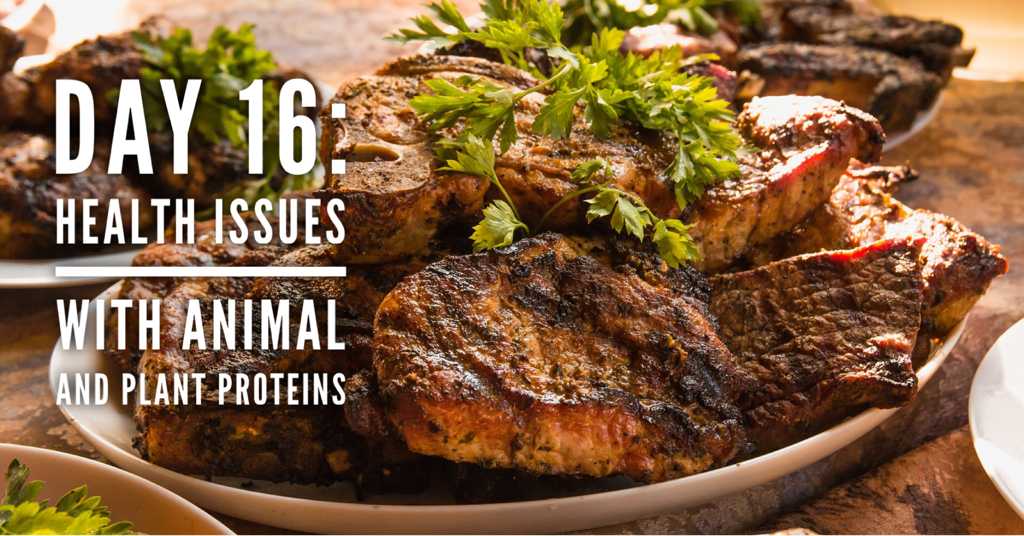Day 16: Health Issues With Animal and Plant Proteins
Why are there people ditching meat and going vegetarian?
Some reasons are obvious. Meat often comes with saturated fat that can increase the LDL cholesterol level, which can clog arteries.
Moreover, studies have shown that red meat, when grilled and charred, may increase your risk for cancer.
Recently, documentaries have shown how some farming practices result in highly-stressed, highly-medicated, and highly-adulterated animal products that make you think whether consuming them is healthy, responsible, or humane.
Others abandon meat consumption because of the association with inflammatory symptoms in their body.
Proteins, whether animal or plant in origin, can cause allergy or intolerance to some people. The top allergens are milk, eggs, fish, shellfish, tree nuts, peanuts, wheat, and soybeans.
The popular protein that’s often put on the chopping block is gluten. Gluten is a type of protein composed of gliadin and glutenin found in wheat grains. People with celiac disease cannot eat gluten because they are gluten-intolerant. Some have no celiac disease but claim to be gluten-sensitive.
In the past, it was hard to stick to a gluten-free diet, but today, we find gluten-free pasta on grocery shelves. Even gluten-free flours are more available now than before. Asian dishes are mostly gluten-free because we eat meals with rice rather than bread or pasta.
Is it possible to earn Mediterranean points with a gluten-free diet?
Yes, it is!
Use other whole grains such as gluten-free oats, corn meal, corn flour, teff flour, and coconut flour. For pasta, try the lentil and chickpea variety. When cooking refined noodles like rice vermicelli or glass bean noodles, increase the vegetable proportion such as shredded cabbage, carrots, and celery into your mix. Mix in some zucchini noodles or tofu noodles. You can also prep and marinade tofu, freeze and air-fry to use as toppings and add more fiber in your dish.
There are many ways to enjoy your favorite dishes and still earn Med Diet points.
What about you?
Do you have issues with protein? How do you cope with them?
Some reasons are obvious. Meat often comes with saturated fat that can increase the LDL cholesterol level, which can clog arteries.
Moreover, studies have shown that red meat, when grilled and charred, may increase your risk for cancer.
Recently, documentaries have shown how some farming practices result in highly-stressed, highly-medicated, and highly-adulterated animal products that make you think whether consuming them is healthy, responsible, or humane.
Others abandon meat consumption because of the association with inflammatory symptoms in their body.
Proteins, whether animal or plant in origin, can cause allergy or intolerance to some people. The top allergens are milk, eggs, fish, shellfish, tree nuts, peanuts, wheat, and soybeans.
The popular protein that’s often put on the chopping block is gluten. Gluten is a type of protein composed of gliadin and glutenin found in wheat grains. People with celiac disease cannot eat gluten because they are gluten-intolerant. Some have no celiac disease but claim to be gluten-sensitive.
In the past, it was hard to stick to a gluten-free diet, but today, we find gluten-free pasta on grocery shelves. Even gluten-free flours are more available now than before. Asian dishes are mostly gluten-free because we eat meals with rice rather than bread or pasta.
Is it possible to earn Mediterranean points with a gluten-free diet?
Yes, it is!
Use other whole grains such as gluten-free oats, corn meal, corn flour, teff flour, and coconut flour. For pasta, try the lentil and chickpea variety. When cooking refined noodles like rice vermicelli or glass bean noodles, increase the vegetable proportion such as shredded cabbage, carrots, and celery into your mix. Mix in some zucchini noodles or tofu noodles. You can also prep and marinade tofu, freeze and air-fry to use as toppings and add more fiber in your dish.
There are many ways to enjoy your favorite dishes and still earn Med Diet points.
What about you?
Do you have issues with protein? How do you cope with them?
PROTEIN CHALLENGE #2
Eat more plant-based protein in an 80/20 ratio. For instance, try being a vegetarian for 5-6 days a week. When cooking, try using only 20% of meat protein in a given dish, and use only the lean variety.

